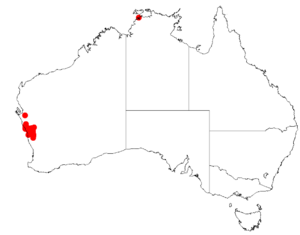Acacia comans facts for kids
Quick facts for kids Acacia comans |
|
|---|---|
| Scientific classification | |
| Genus: |
Acacia
|
| Species: |
comans
|
 |
|
| Occurrence data from AVH | |
Acacia comans is a type of shrub that belongs to the Acacia family, also known as wattles. This plant grows naturally along the west coast of Western Australia.
What Does Acacia comans Look Like?
This shrub usually grows to be about 0.3 to 2 meters (1 to 6.5 feet) tall. It spreads out, making it a wide bush. Its small branches are slightly ribbed and round. They are covered with straight, spreading hairs. The plant also has tiny, needle-like parts called stipules, which are about 1.5 to 2.3 millimeters long and stay on the plant.
Like most Acacia species, this plant has phyllodes instead of true leaves. Phyllodes are flattened leaf stems that look and act like leaves. These phyllodes are stiff and stay green all year. They are shaped like a wide oval or oblong and are not perfectly even on both sides. They are about 3.5 to 9 millimeters long and 1.5 to 5 millimeters wide. Each phyllode has three or four main veins that are raised and spaced apart. The Acacia comans blooms from June to September, producing bright yellow flowers.
How Was Acacia comans Named?
The scientific name for Acacia comans was first officially given by a botanist named William Vincent Fitzgerald in 1904. He described it in a paper called Additions to the West Australian Flora. Later, in 2003, another botanist named Leslie Pedley reclassified it and gave it a different name, Racosperma comans. However, in 2006, it was moved back to the Acacia group, and its name became Acacia comans again.
Where Does Acacia comans Grow?
This shrub is native to the Mid West region of Western Australia. It commonly grows on sandy plains, which are flat areas of sand. You can find these shrubs growing in sandy soils. The area where this plant grows stretches from around Geraldton in the north down to around Coorow in the south.

